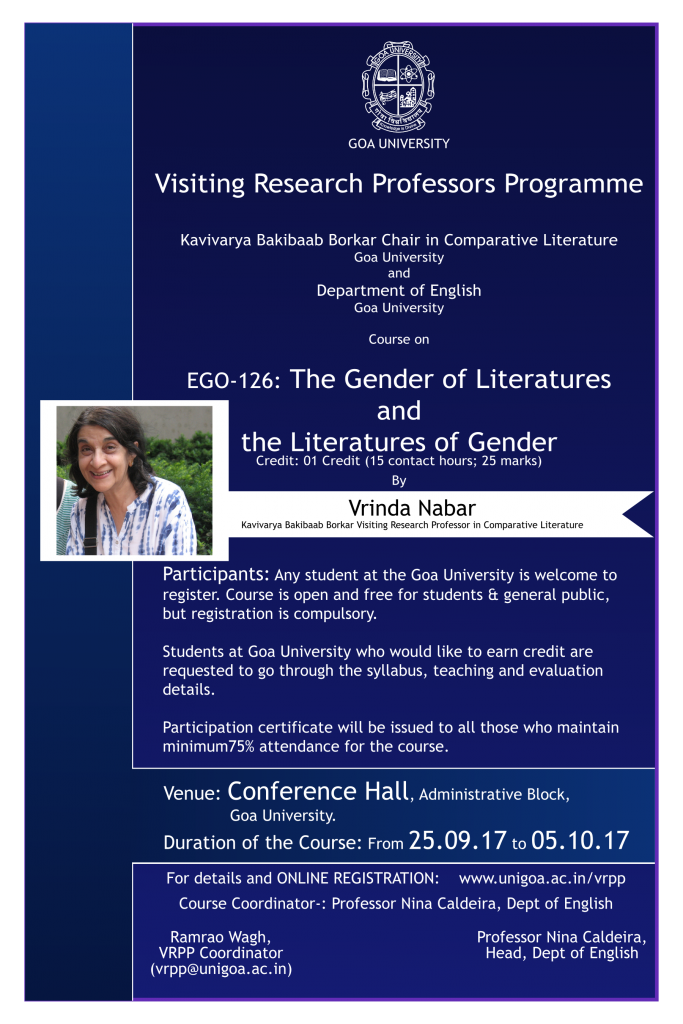EGO 126 The Gender of Literatures and the Literatures of Gender by Professor Vrinda Nabar (Sept/Oct 2017)
-
Goa University
Visiting Research Professors Programme
Kavivarya Bakibaab Borkar Chair in Comparative Literature
EGO 126 The Gender of Literatures and the Literatures of Gender
By
Vrinda Nabar
Visiting Research Professor
Kavivarya Bakibaab Borkar Chair in Comparative Literature
(A one credit course under CBCS for Goa University PG students under Department of English)
The course is open to PG students and Research Scholars of Goa University. Members of the general public are welcome to attend.
Dates: 25th September 2017 to 5th October, 2017
Venue: Conference Hall, Main Building, Goa University
CLICK here for Online Registration
Schedule:
Monday, 25 September, 2:00-4:00 p.m.: Lecture/discussion;
Tuesday, 26 September, 2:00-5:00: Lecture, screening/s, discussion;
Wednesday, 27 September, 2:00-5:00 p.m.: Lecture, screening/s, discussion;
Thursday, 28 September, 2:00-4:00 p.m.: Lecture/discussion;
Tuesday, 3 October, 2:00-5:00 p.m.: Lecture, screening/s, discussion, round up;
Wednesday, 4 October, 2:00-4:00 p.m.: Final Examination.
Evaluation Method:
- Regular participation in class discussions (5 marks).
- Written submission ( 5 marks)
- Final examination (15 Marks)
Notes:
- Attendance is mandatory. Marks will be deducted for continued or unauthorized absences.
- Attendance at the final examination is also mandatory.
Maximum number of students: 25. Selection will be made if there are more than 25 registrations for the course. Only those who register online on the VRPP website will be considered for selection to the course.
Course Coordinator: Professor Nina Caldeira, Head, Department of English
CLICK here for Online Registration
Deadline for applications is 21St September, 2017
Display of list of selected participants: 22nd September, 2017
Course Objective & Syllabus
The Gender of Literatures and the Literatures of Gender
This course would look at canonical “texts” and representations of women across cultures to examine to what extent gender perceptions are universal, have impacted women’s lives, and how cultural contexts have reinvented or indigenized global manifestations. We would touch on the shifting concerns of women’s movements to try and define the complexities inherent in the milestones of so-called “achievements”. The course would also review the changing meanings of terms like “sexuality” and “alternate sexuality” which are now generally accepted as inherent attributes of gender.
Twentieth century archival studies have documented the many creative and imagined ways in which women were historically “wrote” their lives (or had them written by men). The course would work at deconstructing some of this writing, using its universal and contextual priorities to formulate an understanding of the culture/gender dialectic. Since “representations” cannot be looked at in a vacuum, we would also view and analyse ways in which other mediums (notably cinema and documentaries) have reimagined gender and women’s lives, relating these to texts and thereby locating gender and literature within their larger sociocultural contexts.
Attendance is mandatory, and marks will be deducted for unauthorized absences. Students would be required to participate in class discussions (5 Marks).
Readings:
Virginia Woolf: A Room of One’s Own (Chapter 3);
Simone de Beauvoir: The Second Sex – Introduction; Part III: Dreams, Fears, Idols; The Myth of Woman in Five Authors (section on DH Lawrence);
Nandita Gandhi and Nandita Shah: The Issues at Stake: Theory and Practice in the Contemporary Women’s Movement in India (Chapter 2);
Kalpana Kannabiran and Ritu Menon, ed.: From Mathura to Manorama: Resisting Violence Against Women in India – Chapter 3 Alternative Forms of Protest (War & Peace: Ideology and the Architecture of Performance);
Snow White;
Bapsy Sidhwa: Ice Candy Man;
Selections from Snake-Skin and Other Poems of Indira Sant (Indira Sant);
Anjali Purohit: Ragi-Ragini: Chronicles from Aji’s Kitchen (Pages 5-9, 38-42, 56-67, 85-91);
Selections from Volga: The Liberation of Sita;
Ruth Vanita and Saleem Kidwai, ed.: Same-Sex Love in India: A Literary History;
Devdutt Pattanaik: The Man Who Was A Woman and Other Queer Tales From Hindu Folk Lore.
Bio of Professor Vrinda Nabar
A former Chair of English at the University of Mumbai, Vrinda Nabar (b. 1948) studied at the universities of Mumbai and Oxford. She has been a Visiting Professor at Northwestern University (Illinois, USA) and at the Open University (Milton Keynes, UK). Her teaching and research interests have focused on postcolonial issues, Indian literature in English and in English translation, India and the Diaspora, and transnational feminisms. She has also made public presentations of her work at Northwestern University, the University of California, Los Angeles (UCLA), Loyola University (Chicago), West Chester University (PA, USA), the Open University (UK), the Sahitya Akademi, Xavier Institute of Communication, Mumbai, and various universities and colleges in India.
In addition to academic papers and review articles, Vrinda Nabar’s published work includes: the academic bestseller Caste as Woman; Family Fables & Hidden Heresies: A Memoir of Mothers and More; The Bhagavadgita (Introduction and Translation); The Endless Female Hungers: A Study of Kamala Das; and Snake-Skin and Other Poems of Indira Sant (co-translated from the Marathi). She has co-edited Postcolonial Perspectives on the Raj and Its Literature, and Mapping Cultural Spaces: Postcolonial Indian Literature in English. She has also published translations from the poetry of Bakibaab Borkar, Sadanand Rege, Narayan Surve, Mangesh Padgaonkar and Jibanananda Das.
Vrinda Nabar has freelanced extensively for Indian newspapers, radio and television since the 1970s. She wrote the monthly columns “Book Beat” (The Times of India), “First Person” (The Free Press Journal) and “View from My Window” (Harmony); a fortnightly column of arts and ideas for The Indian Post; and was Literary Editor (Fiction) for The Independent (Bombay). She conceptualised and compèred the monthly show “A Time For Books” for Bombay Doordarshan, and presented Marathi poets in translation as well as a series of literary magazines, “Writers of Tomorrow”, for All India Radio, Bombay. For a short while she also worked as a senior Consultant in Corporate Communications with the Tata Group. She lives in Mumbai, India.
Please visit www.unigoa.ac.in/vrpp or email- [email protected] for further details
Ramrao Wagh
VRPP Coordinator, Goa University










